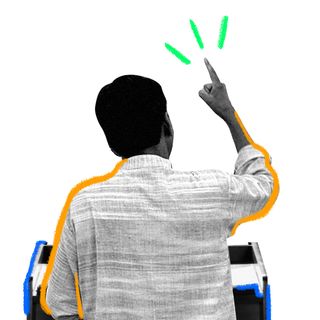
Alleged Assault on Zomato Delivery Agent Is a Reminder of How Everyday Casteism Thrives in India
Instant delivery promises and economic ideas of “efficiency” end up exacerbating violence along caste and class lines.

“Caste is a thing of the past,” many Indians belonging to privileged castes often argue. They’re wrong. This week, news broke of a customer harassing and assaulting a delivery agent from Zomato owing to his caste identity — while he was literally trying to do his job of delivering food. The accused, who allegedly refused to accept the food they had ordered upon finding out it has been handled by a Dalit person, have denied the allegations. They claimed an altercation unrelated to the caste of the parties had broken out, and a caste-based angle was added later to twist the narrative against them.
Even if that doesn’t seem beyond the realm of possibilities, it sounds like an outlier. Especially so, amid the culture of caste-based discrimination — if not outright violence — that prevails in the country. At present, an FIR has been lodged against the accused, and the police are investigating the matter. “[The delivery agent] alleged that when he asked the [customer] to cancel the order if he did not want to accept it, the man got angry and spat tobacco in his face… We are collecting footage of the CCTV cameras installed near the spot to collect evidence in the case. Investigation of the case is on,” S.M. Qasim Abidi, the Additional Deputy Commissioner of Police from East Lucknow, told The Indian Express.
Any interrogation of the veracity of events, though, must account for the power dynamics and casteist undertones of Indian society. The incident, along with other cases of harassment and abuse of gig workers who often come from marginalized caste locations, hints at a troubling nexus.
Moreover, irrespective of what the investigation concludes about the present matter, the fact remains that caste-based violence in India is a cruel reality that has not only remained unaddressed for decades but has, in fact, risen steadily. NewsLaundry’s analysis of data compiled by the National Crime Records Bureau suggests that 74% of the crimes committed against Dalits in the last decade occurred after the current ruling party took over the reins of the country in 2014 — with the number of cases increasing from 33,719 in 2011 to 50,291 in 2020.
“But these figures merely present a slice of the actuality; the systematic and daily subversion of the basic rights of Dalits that socially excludes and accommodates violence against them is ingrained in the very atom of Indian society, even in the 21st century… Socio-economic inequality systematically victimizes Dalits and makes them vulnerable to violence by upper castes,” Jayant Pankaj, a freelance researcher, wrote, penning the analysis.
Related on The Swaddle:
Casteism Still Thrives in Elite Schools in India. What Would Anti‑Caste Education Look Like?
Pankaj is right about the figures steering far away from the actual picture. In India, practices like not serving food or water to domestic workers in the same utensils the family members use, offering them seats only on the floor, preventing them from using the common washrooms, or dedicating a separate lift for delivery agents, construction workers, and other handypersons — are all instances of caste-based discrimination rooted in notions of “purity.”
But they’re so commonplace and normalized within our very households that they go unreported, even unquestioned. Naturally, then, many Indians with caste privilege don’t just believe casteism is a thing of the past, but are completely oblivious to the everydayness of marginalization that takes place right under their noses — except, they believe it’s just the way of life.
Moreover, the present matter isn’t even the first reported instance this year of people refusing to eat food handled by a Dalit person. In December last year, a Dalit cook was fired from a government school in Uttarakhand citing “wrongful appointment” after students refused to eat the food cooked by her, and their parents pressurized the authorities to replace her. Unsurprisingly, she was replaced by a non-Dalit cook until she was reinstated after she filed a complaint under the Scheduled Caste and Scheduled Tribe (Prevention of Atrocities) Act, 1989. Even after that, the boycott of meals cooked by her continued.
In light of this, and the fact that many Indians are reported to have refused food cooked and served by Dalit women in quarantine centers during a global health crisis of epic proportions, the present instance hardly stands out — yet again reflecting just how accustomed we are to the culture of caste-based discrimination. It is, perhaps, the violence involved in the current matter that has led to it garnering the attention it has. As Yashica Dutt, a Dalit writer-journalist, had observed, “Unless casteism is causing violence or Dalits to lose their lives, Indian societies don’t fully acknowledge just how dangerous the caste system is. Most upper-caste people never have to confront the reality of being Dalit.”
Related on The Swaddle:
Making Indian Legal Education More Inclusive Is Key to Building a More Equitable Judicial System
In India, caste is interlinked with socio-economic inequalities that often come together to form the foundation for discriminatory practices. And so, as Pankaj noted, Dalits at the intersection of both forms of marginalization are often more vulnerable to violence and discrimination. Delivery agents — just like domestic workers — are often at this intersection. And so, they’re often left to bear the brunt of the unrealistic and dangerous promises of instant delivery that apps like Zomato, Swiggy, BlinkIt, and Dunzo make — in the name of “progress” and “efficiency.”
Unfortunately, systemic injustices also make the idea of escaping from this grim intersection of caste-and-class-based discrimination seem like an impossible feat. Perhaps, it also is one. As The Radical In Ambedkar: Critical Reflections reads, “[D]iscrimination becomes a source of poverty and aggravates it. The denial of access to public amenities like water, economic rights like land, employment, trade, and business, and discriminatory access to government schemes in some spheres, if not all, reduce access to sources of income for Dalits… The removal of untouchability… is as important as the problem of poverty. If poverty is the daily experience of hunger, discrimination is the daily experience of humiliation and contempt.”
While the outcome of the present matter continues to remain undecided, it has once again served as a reminder to the casteist mindsets that thrive around us — within our families, our professional networks, and, perhaps, even our extended friend circles. Unchecked and unfettered, they flourish — traumatizing those at the receiving end of their casteism-fuelled ire, as the spate of discriminatory treatments against Dalits indicates.
Pankaj had written, “[T]he police generally perceive the Dalit community as inherently criminal. Dalits are overrepresented among those who are detained and tortured as they cannot afford to pay bribes and lack social or political support. Political representatives, too, mirror the Brahminism inherent in society.” Therefore, to ensure justice is served, one can hope the ongoing investigation doesn’t fall into the same trap.
Devrupa Rakshit is an Associate Editor at The Swaddle. She is a lawyer by education, a poet by accident, a painter by shaukh, and autistic by birth. You can find her on Instagram @devruparakshit.
Related


World Swimming Body Bans Trans Athletes From Women’s Events
